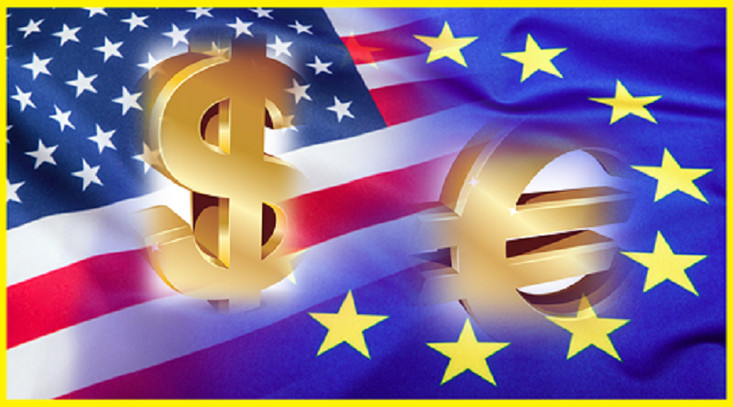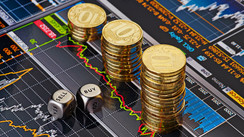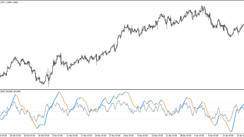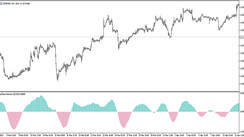The dollar remained under pressure during today's Asian session and fell sharply at the start of the European session. The DXY dollar index broke through the significant support level 90.00 today.
As of this writing, DXY futures are traded near 89.82, bouncing off today's and 3-month lows of 89.73. The DXY dollar index is falling today for the third trading day in a row, completely losing the positive momentum received last week after the publication of data on inflation in the United States that exceeded economists' expectations.
As you know, the consumer price index in the United States in April rose by 0.8%, which was the strongest monthly growth since 2009. In annual terms, inflation rose by 4.2% versus 2.6% between March 2020 and March 2021. This is the strongest acceleration in inflation since 2008.
The core CPI, which excludes volatile food and energy prices, climbed 0.9% in April to grow 3.0% year-on-year, the most significant gain since 1995.
However, the dollar is declining again. Fed officials seem unconcerned about the spike in inflation. Federal Reserve Deputy Chairman Richard Clarida, speaking on Monday, said that the process of restarting the economy could be uneven. Clarida said that the state of the labor market signals the need for further stimulus, thereby signaling the Fed's inclination to continue its monetary stimulus policy.
Loose monetary policy, coupled with increased inflation, is putting pressure on real yields, which is negative for the dollar. Thus, the dollar may continue to decline in the short term, as the Federal Reserve maintains a loose monetary policy, not paying attention to rising inflation.
Today, volatility in dollar quotes may rise again at 12:30 (GMT), when the latest data on new home construction in the US will be published. Economists are forecasting a slight pullback in April (to 1.71 million) after rising to a 15-year high (1.739 million) in March. These are factors that are positive for the dollar and American stock indices.
But the main attention of market participants will be focused on tomorrow's publication (at 18:00 GMT) of the minutes of the April meeting of the Federal Open Market Committee (FOMC).
Probably, the minutes will confirm the inclination of the central bank management to continue pursuing the current monetary policy without changing its parameters, which will be another argument in favor of short positions on the dollar.
At the same time, as has happened more than once before, the Fed leaders may make unexpected statements and express concerns about growing inflation, which may provoke an increase in volatility in dollar quotes and partial closure of short positions on it.
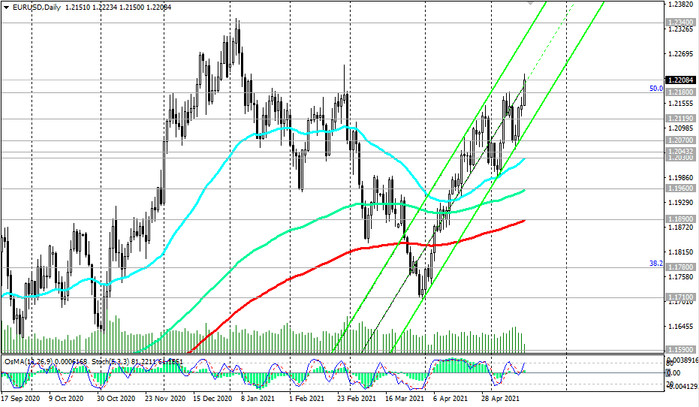
Meanwhile, EUR / USD rallied sharply in early European session today, hitting 1.2222, nearly 4-month highs, ignoring weak Eurozone GDP data released at 09:00 (GMT). According to Eurostat data, the Eurozone economy contracted by -0.6% in the 1st quarter (by -1.8% on an annualized basis), which coincided with the first estimate. At the same time, the level of employment in the Eurozone in the 1st quarter decreased by -0.3% q / q (-2.1% y / y), which is worse than the forecast +0.4% and -1.9%, respectively.
Today, market participants will pay attention to the speech at 14:00 (GMT) by the head of the ECB Christine Lagarde. During her speech, volatility may increase not only in the quotations of the euro and European stock indices, but throughout the financial market, especially if she touches on the monetary policy of the ECB. Any hints at curtailing the QE program in the Eurozone will cause the euro to rise. The soft tone of Christine Lagarde's speech and the propensity to continue the extra soft monetary policy of the ECB will negatively affect the euro.
In the Eurozone, the vaccination campaign continues to be deployed, but Lagarde is likely to speak in favor of a "significantly higher" pace of purchases under the PEPP program after the ECB's June meeting and that the central bank has no reason to reduce purchases. If Christine Lagarde does not touch on the topic of monetary policy, then the reaction to her speech will be weak.
Nonetheless, market participants will closely monitor any hints from ECB representatives about the propensity to change the parameters of monetary policy, as they can become starting points in a sharp reversal of expectations about the continuation or curtailment of the stimulus.

